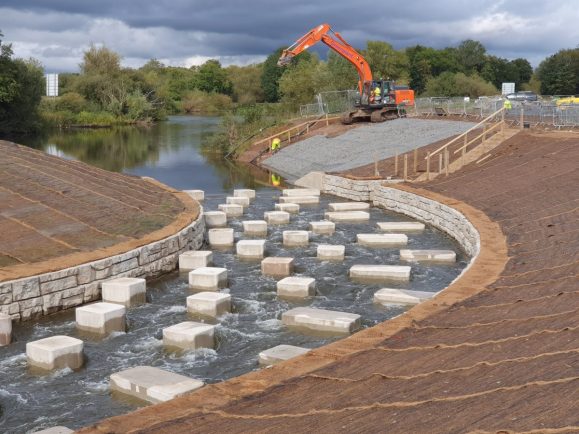A CONSERVATION project on the UK’s longest river is celebrating a major milestone as the first of its large-scale fish passes has been opened to river fish.
After years of bid development and a period of 16 months since the works commenced alongside Bevere weir, the fish pass, just north of Worcester has now been completed. The construction on this site faced challenges from exceptional rainfall and river levels over the autumn/winter months, including the wettest February on record. With added impact from COVID19 lockdown, the site couldn’t restart work until late spring this year.
However, last week specialist divers cut the steel piles at the mouth of the fish pass and a temporary dam was removed, allowing the river water to finally flow through the new structure.
Now, for the first time in more than 170 years, river fish have free passage past the weir at Bevere. This is the first of four important and innovative fish passes, being installed on the River Severn as part of the project Unlocking the Severn.
At Bevere, the fish pass takes the form a 100m bypass channel, through which fish can swim up a gradually sloped rock-ramp channel around the weir. Blocks cast into the base of the channel act to slow the water and break up the flow. This creates the conditions that fish, including the endangered twaite shad, can comfortably swim through.
Jason Leach, programme director, Canal & River Trust, comments: “This was a great day for our project. The team have persevered through some challenging conditions, and we are very pleased to see the river flowing through our fish pass at Bevere for the benefit of rare and endangered fish.”
Weirs represent a major barrier to natural fish migration journeys within the river. Fish that will benefit include twaite shad as well as salmon, lamprey and eels. In fact, re-establishing healthy populations of native fish has positive impacts for a wide range of wildlife throughout the river ecosystem.
Navigation weirs on the River Severn were installed in the 1840’s to aid the transport of industrial materials and goods between the black country and the docks at Gloucester. However, these weirs had devastating results for river wildlife – particularly twaite shad. This annual river visitor was traditionally known as the ‘May Fish.’ Before weirs blocked their path, every spring hundreds of thousands twaite shad migrated from the sea to reach their spawning grounds far up the River Severn.
The next fish pass due for completion by Unlocking the Severn is at Diglis, near Worcester City centre. This pass will be the biggest deep vertical slot fish pass in England and Wales and include a unique underwater viewing window to observe fish swimming through the pass. Works at Diglis are due to complete by the end of the year. Unlocking the Severn is also installing fish passes further upriver alongside Holt and Lincomb weirs.
At Bevere, the site landscaping will now be finished, with the riverside footpath, now tracking alongside new fish pass, due to be reinstated by the end of October.
The Bevere fish pass has been delivered by Canal & River Trust as part of Unlocking the Severn in partnership with Severn Rivers Trust, the Environment Agency and Natural England. The main contractor is Kier. Unlocking the Severn is one of the largest river connectivity projects of its kind ever attempted in Europe and has been made possible through funding from the National Lottery Heritage Fund and the European Union LIFE programme.











